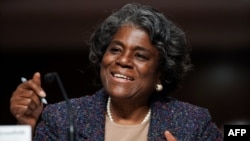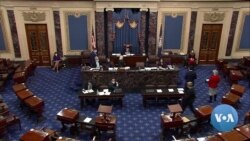The U.S. Senate confirmed President Joe Biden’s pick for ambassador to the United Nations on Tuesday, after objections from some Republicans delayed her appointment.
Linda Thomas-Greenfield was confirmed on a vote of 78 in favor to 20 against. She received bipartisan support, including yes votes from more than 20 Republican senators, among them Lindsay Graham, Mitt Romney and Minority Leader Mitch McConnell. Republicans Bill Cassidy and John Kennedy of her home state, Louisiana, also supported her.
Her confirmation comes less than one week before the United States takes over the rotating presidency of the U.N. Security Council on March 1.
She will also take a seat in President Biden’s Cabinet.
Delays
The Senate Foreign Relations Committee held Thomas-Greenfield’s confirmation hearing on Jan. 27. Senators from both parties grilled the 35-year State Department veteran about a speech she gave as a retired diplomat in 2019. The event was at the historically Black Savannah State University in Georgia, at the campus’ Confucius Institute, which is funded by the Chinese government. Her remarks focused on the U.S. and China’s investment in Africa, and several senators criticized her for being soft on Beijing.
During her confirmation hearing, the long-time U.S. diplomat pushed back against the accusations saying she has spoken out about Beijing’s behavior throughout her career, including what she called China’s “self-interested and parasitic development goals” in Africa.
“And I see what they are doing at the U.N. as undermining our values, undermining what we believe in,” she told members of the Senate Foreign Relations Committee at the time. “They are undermining our security, they are undermining our people, and we need to work against that.”
Her nomination passed though the committee, but Republican Senator Ted Cruz, unsatisfied with her stance on China, used a committee rule to delay her final confirmation until after the second impeachment trial of former president Donald Trump. On Tuesday, Cruz voted against her confirmation.
Life and Career
Born in 1952 in the southern state of Louisiana, Thomas-Greenfield, who is African-American, was one of eight siblings. She said her father left school in the third grade to help support his family.
"He couldn't read or write, but he was the smartest man I knew," she said of him in a 2019 TED talk.
She said her mother also had limited education, but a big heart. In addition to raising her own children, she took in eight siblings who lost their mother so they would not be separated.
"I didn't have successful, educated role models in my life, but what I did have – I had the hopes and dreams of my mother, who taught me at a very early age that I could face any challenge or adversity put in my path by being compassionate and being kind," Thomas-Greenfield said.
She grew up during the civil rights era, graduating from a segregated high school and going on to Louisiana State University, which had to be forced to accept Black students by a court order.
During her State Department career, Thomas Greenfield has worked in both Democratic and Republican administrations. An Africa specialist, she served as U.S. ambassador to Liberia, and held posts in Kenya, The Gambia and Nigeria. Under then-President Barack Obama, she served as the assistant secretary for the Bureau of African Affairs (2013-2017), developing and managing Washington's policy toward sub-Saharan Africa. She has also worked in Geneva at the U.S. Mission to the United Nations.
In 1994, she arrived in Kigali as Rwanda as Hutu extremists began their 100-day genocide against minority Tutsis. She nearly became a victim of the violence when she was confronted by a "glaze-eyed man" who was ready to kill her. She escaped the incident but has said the genocide "changed my life forever."
Challenges Ahead
Thomas-Greenfield will face challenges at the United Nations. The Trump administration was largely indifferent to the organization and pulled back its support – both financial and diplomatic – on several fronts. President Biden has vowed to reengage with the world body and embrace multilateralism.
Louis Charbonneau, U.N. director at Human Rights Watch, urged the ambassador to make the promotion and protection of human rights a top priority.
“She should abandon the Trump administration’s selective approach to human rights – enthusiastically condemning its enemies’ abuses while ignoring rights violations of allies like Israel and Saudi Arabia, but there’s room for continuity on China and Syria,” Charbonneau said. “She should make expanding the coalition of nations willing to speak out against Beijing’s human rights abuses one of her chief goals at the U.N., and she should continue to push for expanded humanitarian access to all parts of Syria.”
The United Nations has been at the forefront in trying to rally global cooperation on combatting climate change and fighting the COVID-19 pandemic. The U.N. secretary-general has welcomed Washington’s reengagement on both issues.







